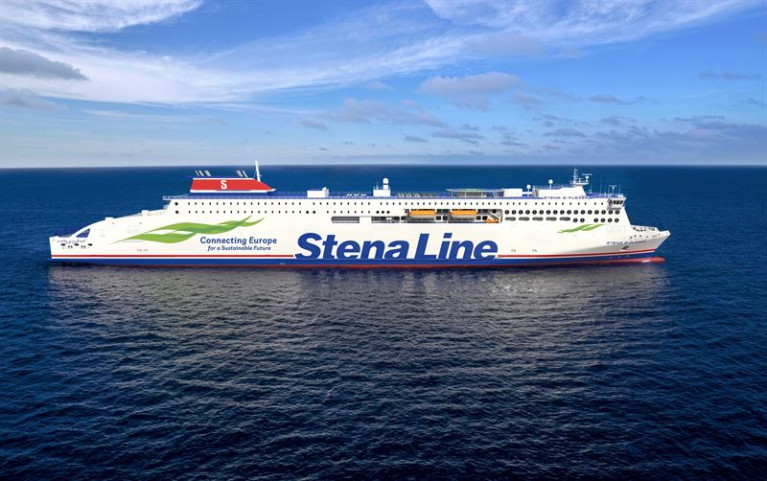Stena Line which operates three of their 'E-Flexer' ro-pax class ferries on the Irish Sea, is to continue its expansion on the Baltic Sea during 2022, increasing both freight-and passenger capacity with larger versions of the new class.
The Swedish family-owned ferry company today announced that they will deploy their two new 240-meter-long fuel-efficient E-Flexer* ferries, on the Nynäshamn (Sweden)-Ventspils (Latvia) next year.
Stena Line also announced plans to increase the capacity on the Karlskrona (Sweden)-Gdynia (Poland) route with the deployment of the two large and modern ferries Stena Scandica and Stena Baltica. This pair, Afloat adds were formerly operating on the Irish Sea on their Belfast-Birkenhead (Liverpool) route until replaced by two E-Flexers and following introduction of class leadship Stena Estrid on the Dublin-Holyhead route in 2020.
Over the past year, Stena Line has expanded in the Baltic Sea, increasing both freight and passenger capacity, to cater for increasing demand of sea transportation in the region. This year Stena Line have already introduced new large and modern ferries on both of their two Latvian routes Nynäshamn-Ventspils and Travemünde (Germany)-Liepaja (Latvia).
Today, the ferry company announced that their expansion on the Baltic Sea will continue during 2022. Next year Stena Line will deploy their two new 240-meter-long fuel-efficient E-Flexer* ferries on the Nynäshamn -Ventspils route. The ferries will have a capacity for 1,200 passengers, an increase of 33% compared to existing ferries, and a total of 3,600 meters of freight lane meters, an increase of 25%.
“We continue growing together with our customers by strengthen our position and fleet across the Baltic Sea. Demand for capacity in the region keeps increasing as freight customers continue to expand and travel passengers choose ferry travel as their preferred safe form of transport in the wake of the pandemic. These large, modern, and fuel-efficient next generation ferries are the flag ships in the modernisation of our fleet as well as our development of sustainable shipping” says Niclas Mårtensson, CEO Stena Line Group.
Up to 30 % more energy efficient
Stena Line’s position as the leader in sustainable shipping is clearly visible and the new vessels are among the most energy efficient RoPax ferries in the world. The E-Flexer ferries are up to 30 % more energy efficient than existing vessels, thanks to optimum design of the hulls, propellers, bulbs, and rudders.
The vessels are delivered gas-ready, to allow conversion to methanol or liquid natural gas fuel. The new ferries will be equipped to use shore power during port calls to reduce emissions and the electricity connection also enables a conversion to battery hybrid in the future. The vessel will offer efficient loading and unloading with drive-through lanes on the two levels.
“Stena Line’s Scandinavian heritage is clearly visible on the interior and the design is spacious and light, with amazing panoramic views. The new vessels will offer our passengers a brand new onboard and travel experience on Ventspils-Nynäshamn, the shortest route between the Baltics and Scandinavia”, says Johan Edelman”, Trade Director Baltic Sea North, Stena Line.
Capacity increase on Karlskrona (Sweden)-Gdynia (Poland).
Stena Line today also announce their plans to increase the capacity on the Karlskrona-Gdynia route further during 2022 with the deployment of the two large and modern 222-meter RoPax ferries Stena Scandica and Stena Baltica. The two Visentini vessels has recently been lengthened and modernised and will add 30 % freight capacity and a brand new modern onboard experience for both drivers and passengers on the Karlskrona-Gdynia route.
*Ferry facts: E-Flexer ferries
The two 240-meter E-Flexer (MkII) ferries are designed in collaboration with Stena RoRo and is currently being built at the CMI Jinling Shipyard in Weihai, China, with expected delivery during 2022.
Stena Line has previously introduced the three 214-meter E-Flexer ferries Stena Estrid, Stena Edda and Stena Embla on the Irish Sea during 2019-2020. The E-Flexer ferries are among the most energy efficient RoPax ferries in the world, up 30 % more energy efficient than existing vessels, thanks to optimum design of the hulls, propellers, bulbs, and rudders.
Route: Nynäshamn (Sweden) – Ventspils (Latvia)
Names: not yet revealed by Stena Line
Length: 239,7 m
Breadth: 27,8 m
Lane meters: 3,600
Passengers: 1200
Cabins: 263


























































